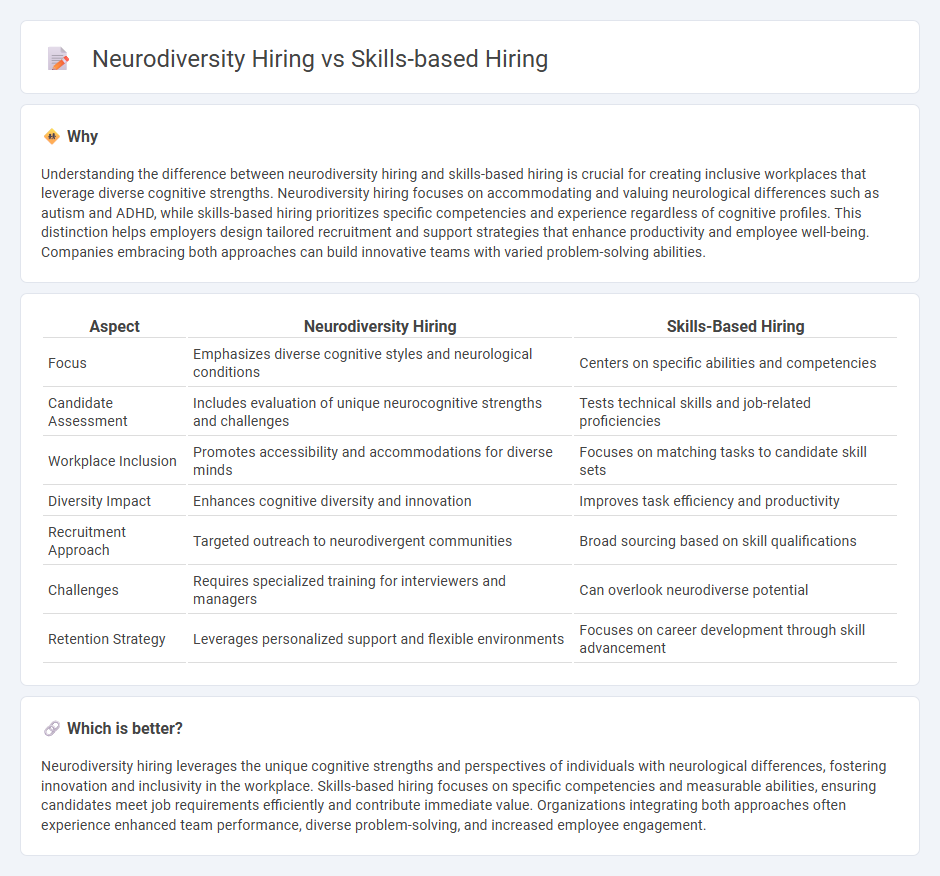
Neurodiversity hiring focuses on recognizing and valuing cognitive differences such as autism, ADHD, and dyslexia to create inclusive workplaces that leverage unique problem-solving abilities. Skills-based hiring prioritizes candidates' competencies and practical experience over formal education or traditional qualifications, aiming to match talent directly to job requirements. Explore how these hiring strategies impact workforce diversity and business innovation.
Why it is important
Understanding the difference between neurodiversity hiring and skills-based hiring is crucial for creating inclusive workplaces that leverage diverse cognitive strengths. Neurodiversity hiring focuses on accommodating and valuing neurological differences such as autism and ADHD, while skills-based hiring prioritizes specific competencies and experience regardless of cognitive profiles. This distinction helps employers design tailored recruitment and support strategies that enhance productivity and employee well-being. Companies embracing both approaches can build innovative teams with varied problem-solving abilities.
Comparison Table
| Aspect | Neurodiversity Hiring | Skills-Based Hiring |
|---|---|---|
| Focus | Emphasizes diverse cognitive styles and neurological conditions | Centers on specific abilities and competencies |
| Candidate Assessment | Includes evaluation of unique neurocognitive strengths and challenges | Tests technical skills and job-related proficiencies |
| Workplace Inclusion | Promotes accessibility and accommodations for diverse minds | Focuses on matching tasks to candidate skill sets |
| Diversity Impact | Enhances cognitive diversity and innovation | Improves task efficiency and productivity |
| Recruitment Approach | Targeted outreach to neurodivergent communities | Broad sourcing based on skill qualifications |
| Challenges | Requires specialized training for interviewers and managers | Can overlook neurodiverse potential |
| Retention Strategy | Leverages personalized support and flexible environments | Focuses on career development through skill advancement |
Which is better?
Neurodiversity hiring leverages the unique cognitive strengths and perspectives of individuals with neurological differences, fostering innovation and inclusivity in the workplace. Skills-based hiring focuses on specific competencies and measurable abilities, ensuring candidates meet job requirements efficiently and contribute immediate value. Organizations integrating both approaches often experience enhanced team performance, diverse problem-solving, and increased employee engagement.
Connection
Neurodiversity hiring and skills-based hiring are interconnected by prioritizing individual strengths and competencies over traditional qualifications, fostering inclusive workplaces that leverage diverse cognitive profiles. Companies adopting these approaches improve talent acquisition by recognizing unique problem-solving abilities and promoting equitable employment opportunities. This synergy enhances innovation, productivity, and retention through targeted matching of skills to job requirements rather than relying solely on educational background or experience.
Key Terms
Competency Assessment
Skills-based hiring emphasizes evaluating candidates through objective competency assessments that measure specific job-related abilities, ensuring a precise fit for organizational needs. Neurodiversity hiring incorporates these assessments while adapting methodologies to accommodate diverse cognitive profiles, promoting inclusion without compromising on skill validation. Explore deeper insights into competency assessment strategies that optimize both skills-based and neurodiverse recruitment.
Cognitive Diversity
Skills-based hiring emphasizes evaluating candidates primarily on their specific abilities and job-related competencies, enabling organizations to match precise skills with role requirements efficiently. Neurodiversity hiring recognizes and values diverse cognitive profiles, such as autism and ADHD, fostering innovation and problem-solving through varied thinking patterns. Explore how integrating cognitive diversity into hiring strategies can enhance workplace productivity and drive inclusive growth.
Inclusive Recruitment
Skills-based hiring emphasizes evaluating candidates based on specific competencies and practical abilities, promoting fairness by minimizing biases associated with traditional qualifications. Neurodiversity hiring prioritizes embracing cognitive differences, such as autism or ADHD, to foster innovation and diverse problem-solving within teams. Explore strategies to implement inclusive recruitment practices that combine both approaches for a more diverse and effective workforce.
Source and External Links
Skills-based hiring - Wikipedia - Skills-based hiring is the practice where employers set specific skill requirements for jobs, allowing candidates to prove their abilities independently from academic degrees, making hiring more efficient and focused on relevant competencies such as cognitive or professional "soft" skills.
Skills-Based Hiring: Why It's Time to Rethink Hiring - Radancy Blog - Skills-based hiring prioritizes candidates' actual skills over traditional credentials, expanding talent pools and improving diversity, with adoption rising from 57% in 2022 to 81% in 2024 as companies adjust to talent shortages and drive better hires using AI and data-driven insights.
Why Skills-Based Hiring Is so Revolutionary - Workday Blog - Skills-based hiring focuses on candidates' capabilities rather than education history, replacing traditional role-based hiring and enabling organizations to use practical skills assessments, with over half of U.S. job postings now dropping formal education requirements to better match workforce needs.
 dowidth.com
dowidth.com